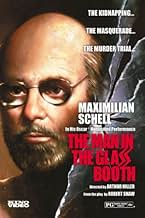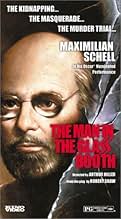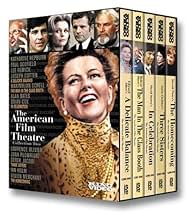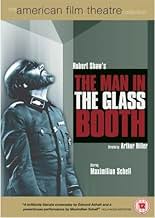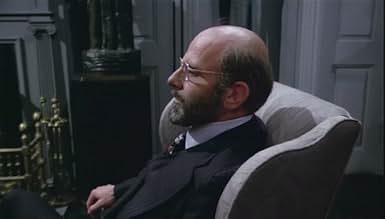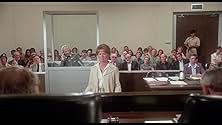PUNTUACIÓN EN IMDb
7,0/10
1,7 mil
TU PUNTUACIÓN
Agentes del Mossad secuestran a un judío estadounidense, lo acusan de ser un criminal de guerra nazi fugitivo y lo llevan a Jerusalén para enfrentar un juicio por genocidio.Agentes del Mossad secuestran a un judío estadounidense, lo acusan de ser un criminal de guerra nazi fugitivo y lo llevan a Jerusalén para enfrentar un juicio por genocidio.Agentes del Mossad secuestran a un judío estadounidense, lo acusan de ser un criminal de guerra nazi fugitivo y lo llevan a Jerusalén para enfrentar un juicio por genocidio.
- Dirección
- Guión
- Reparto principal
- Nominado para 1 premio Óscar
- 3 nominaciones en total
Leonidas Ossetynski
- Samuel Weinberg
- (as Leonidas Ossettynski)
Reseñas destacadas
Although I have not seen this film for years it sticks in my mind as one of the best, particularly for its type, ie a courtroom dram, with few different scenes, (the other similar movie I liked was Twelve Angry Men.
The acting is superb, particularly Max Schell as the Nazi and the twists keep the viewer alert.
It is the type of movie that should be shown on TV much more often. It does have a message as well.
The acting is superb, particularly Max Schell as the Nazi and the twists keep the viewer alert.
It is the type of movie that should be shown on TV much more often. It does have a message as well.
The first half of "The Man in the Glass Booth" makes the viewer unsure of what to expect, as Maximilian Schell's protagonist - identified as a survivor of the concentration camps - orates about his experiences and desires. That's when everything changes. But even after this change, the protagonist maintains his attitude. So what's going to become of him, you ask.
The original source was Robert Shaw's 1967 novel, but it got adapted as a play in 1968, and the movie does feel more like a play. Quite a few things in the movie catch you off guard. In the end, it's a fine piece of work. A number of the scenes have a Hitchcock level of suspense. Definitely worth seeing.
The original source was Robert Shaw's 1967 novel, but it got adapted as a play in 1968, and the movie does feel more like a play. Quite a few things in the movie catch you off guard. In the end, it's a fine piece of work. A number of the scenes have a Hitchcock level of suspense. Definitely worth seeing.
10zenda
This is my all-time favorite film. Maximilian Schell's Oscar-nominated performance completely dominates everything else on the screen. His long courtroom speeches are both disturbing and riveting. This is based on a book and play by Robert Shaw, who'll you'll probably remember as an actor from "The Sting", "Jaws" and "A Man for All Seasons". He disowned the movie version because of changes made. It has been too many years since I've seen the film, but I have re-read both book and play this month. I think a significant change to Col. Dorff's heritage was probably his objection. While I see his point, I think he overreacted. The film itself is a bit slow moving and everyone else is overpowered by Mr. Schell's breathtaking performance. But those flaws didn't kick in for me until I had seen the film a dozen or more times. It is a must see for Maximilian Schell's work- one of the greatest performances ever filmed.
I have viewed this movie many times in a poor quality VHS and now finally on DVD. It's difficult to explain the impact this movie can have and one viewing will not do it. It takes several viewings to really get the plot line. Millionaire Jewish entrepreneur Arthur Goldman rules his financial empire from a penthouse apartment overlooking Manhattan. Seemingly at the edge of sanity, Goldman holds forth on everyting from Papal edicts to ex-wives, from baseball to his family's massacre in a Nazi concentration camp. When Goldman remarks on a blue Mercedes continuously parked outside his building, Goldman's captive audience of assistant and chauffeur dismiss their boss' anxiety as encroaching paranoia. But each of Goldman's passionate, seemingly capricious ravings are transformed into a shocking, inadvertent deposition when Israeli agents capture Goldman and put him on trial as Adolph Dorf, the commandant of the concentration camp where Goldman's family was supposedly exterminated. In a trial scene of unrelenting intensity, crafts what the Detroit Free Press called "a white-hot lead performance," mutating from eccentric Goldman to sociopath Dorf and beyond. The riddle of Dorf's true identity becomes wrapped in an enigma of cunning self-treachery and single-minded obsession.
7sol-
A fairly fascinating film, with a thought-provoking, albeit rather contrived, twist at the end, the material is helped a great deal by Maximilian Schell's Oscar nominated performance as the title person. Schell is startlingly good, considering what he has to do, balancing out two different eccentric personalities that are part of his one character. The character he plays is the most intriguing element throughout, but it does have a tendency to dominate, and therefore overshadow the things that film has to say. It also takes a while to get where its going, however the second half is highly intense stuff, and the film is merited by interesting ideas the whole time through.
¿Sabías que...?
- CuriosidadesThis film was part of the American Film Theatre series, an experiment in marketing films (all based on plays) that would not otherwise have been able to get financing. Instead of being released to the general public, only people who purchased a subscription to the American Film Theatre series could buy tickets to any of its films. (Exceptions were made for movie critics and members of award-granting organizations, such as the American Academy of Motion Picture Arts and Sciences which awards the Oscars.) As a result, only a small number of people ever saw any of the films in their theatre runs. To enhance the value of the subscriptions, subscribers were guaranteed that the films would never be shown on television and never released to the general public. Legal issues connected with these guarantees kept this film from being available in any form for nearly 3 decades. It was finally released on DVD in 2003. The American Film Theatre experiment was abandoned after 2 years.
- PifiasThe Nazi Concentration Camps were run by the SS. The Wehrmacht (the regular German Army, also referred to as the Heer) was not directly involved in running the camps. Also The SS used it's own rank titles, so Dorf would have been known as a Standartenfuhrer instead of an Oberst (Colonel).
- Citas
Arthur Goldman: Passion play is a passion play.
- ConexionesFeatured in Sunset Over Mulholland Drive (2019)
- Banda sonoraEs war ein Edelweiss
(uncredited)
Written by Herms Niel
Sung by Lawrence Pressman and Maximilian Schell
Selecciones populares
Inicia sesión para calificar y añadir a tu lista para recibir recomendaciones personalizadas
- How long is The Man in the Glass Booth?Con tecnología de Alexa
Detalles
- Fecha de lanzamiento
- País de origen
- Idiomas
- Títulos en diferentes países
- The Man in the Glass Booth
- Localizaciones del rodaje
- Empresas productoras
- Ver más compañías en los créditos en IMDbPro
Taquilla
- Presupuesto
- 1.000.000 US$ (estimación)
- Duración1 hora 57 minutos
- Mezcla de sonido
- Relación de aspecto
- 1.85 : 1
Contribuir a esta página
Sugerir un cambio o añadir el contenido que falta

